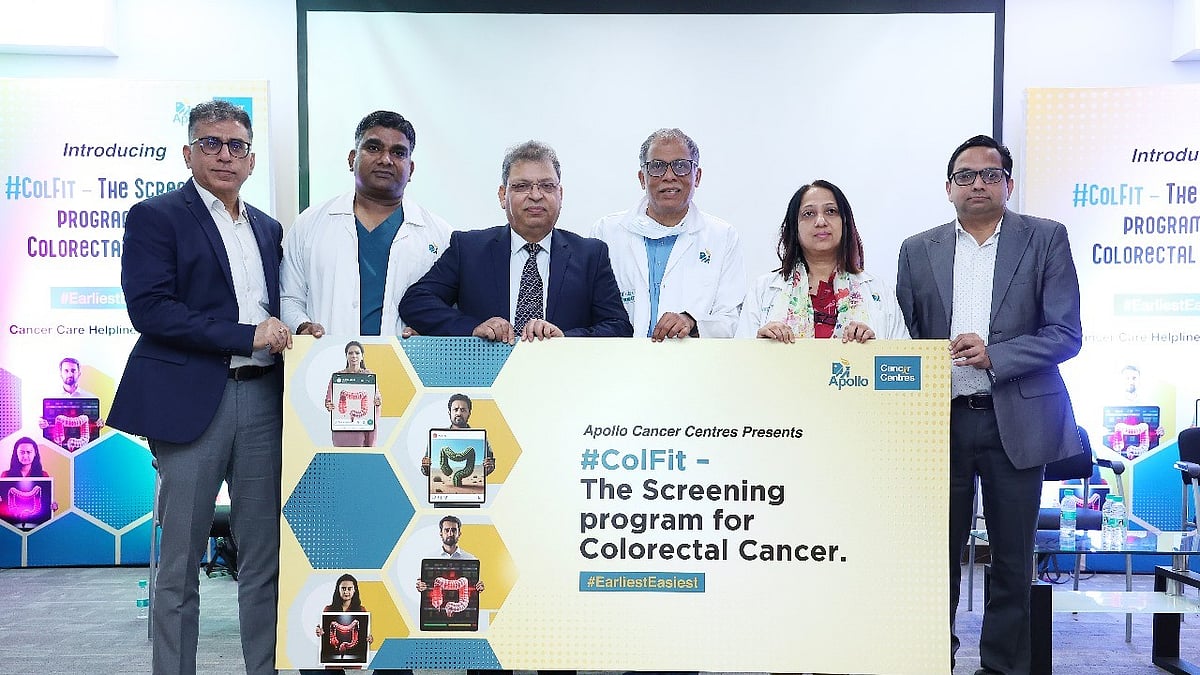r. Purushottam Vashistha – Sr. Consultant, Gastroenterology, AHNM Dr. Rajesh Shinde – Consultant, HPB, GI, Thoracic Oncology & Robotic Surgery, AHNM Dr Ravi Shankar – Director Medical Services, AHNM, Dr. Anil D’Cruz – Director, Oncology & Sr. Head & Neck Oncosurgeon, AHNM Dr Jyoti Bajpai – Lead-Medical and Precision Oncology (Mumbai & Maharashtra Region)
Dr. Deepak Kumar Gupta – Sr. Consultant, Gastroenterology, AHNM | FPJ/ Farooq Sayed
With the rising incidence of colorectal cancer (CRC) in India, Apollo Cancer Centres (ACC) has introduced ColFit, an innovative screening program aimed at early detection and prevention. This initiative seeks to improve survival rates, reduce treatment costs, and address the alarming trend of late-stage CRC diagnoses, which often result in poor patient outcomes and increased healthcare burdens. CRC ranks third globally in cancer incidence and stands fourth in India.
“Over the past two decades, CRC cases in the country have increased by 2 to 3 percent annually. It is one of the most preventable and treatable cancers when detected early,” Dr. Deepak Kumar Gupta, Senior Consultant Gastroenterology at Apollo Hospitals, Navi Mumbai, said.

Despite being one of the most preventable and treatable cancers when detected early, a significant proportion of CRC cases in India are diagnosed at advanced stages. India’s age-standardized rate (ASR) for CRC is 7.2 per 100,000 males and 5.1 per 100,000 females, but the sheer size of the population results in a substantial number of cases. More concerning is the five-year survival rate for CRC in India, which is less than 40 percent, among the lowest globally. Studies such as CONCORD-2 have highlighted a decline in survival rates for rectal cancer in certain Indian registries. According to the doctors CRC often starts as simple polyps which grows in a period of time of 10 to 15 years to become cancerous. “Almost 10% of piles and fissures are cancers which people never get screened from specialists and instead just simply treat the piles. Every piles and fissure issues should be examined and ruled out for cancer,” the doctors of Apollo Hospitals, further mentioned.
Colorectal cancer presents with symptoms that should not be ignored, including persistent changes in bowel habits, rectal bleeding, unexplained weight loss, and chronic abdominal discomfort. The key risk factors for CRC include a low-fiber diet, sedentary lifestyle, obesity, genetic predisposition, and a family history of CRC. Early detection remains critical in preventing disease progression and improving treatment outcomes.
The ColFit program introduces an innovative approach to CRC screening, utilizing the Faecal Immunochemical Test (FIT), a non-invasive and highly accurate diagnostic tool designed to detect hidden blood in stool, which is one of the earliest indicators of CRC. FIT requires only a single sample, offers high sensitivity, and eliminates dietary restrictions, making it a convenient and patient-friendly screening method.
The ColFit screening pathway follows a structured approach. Patients are categorized based on their risk levels. Average-risk individuals aged 45 and above with no family history undergo FIT and stool tests. High-risk individuals with a family history, genetic syndromes, or inflammatory bowel disease are recommended FIT and colonoscopy.
If abnormal results are found, further stool sample analysis is conducted to detect occult blood or DNA mutations. Colonoscopy findings are examined for polyps or tumors.
For follow-up and counseling, negative cases are advised to have periodic follow-ups ranging from one to ten years. Positive cases undergo further evaluation, including biopsies if necessary. Patients receive counseling on lifestyle changes, personalized screening plans, and genetic counseling for high-risk individuals. Dr. Purushottam Vashistha, Senior Consultant Gastroenterology at Apollo Hospitals Navi Mumbai (AHNM), emphasized the importance of proactive screening. “There must be a shift from reactive care to proactive screening for colorectal cancer. A high-fiber diet, regular exercise, and screenings like FIT can play a pivotal role in prevention,” he said.
Dr. Rajesh Shinde, Consultant HPB, GI, Thoracic Oncology and Robotic Surgery at ACC Mumbai, added that colorectal cancer affects both young and elderly populations in India, yet survival rates remain low due to late-stage diagnoses. “Nearly 50 percent of CRC cases are detected at advanced stages, with an additional 20 percent presenting with metastases. Early screening through ColFit can reverse this trend. When diagnosed at the first stage, it can be treated 100%, in the second stage it can be treated 90 to 92%,” Dr Shinde said.
Dr Gupta urged that individuals, especially those with a family history or persistent symptoms, to prioritize routine screenings.
